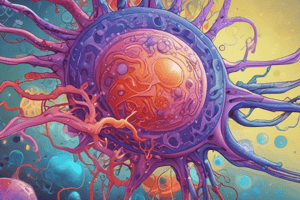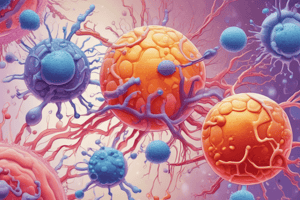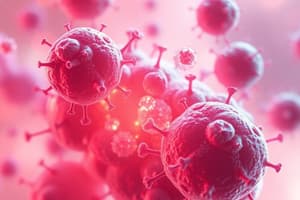Podcast
Questions and Answers
What is the major role of T-cells in cell-mediated immunity?
What is the major role of T-cells in cell-mediated immunity?
- Recruiting leukocytes
- Stimulating the ability of macrophages
- Producing antibodies
- Killing infected cells (correct)
What is the function of naive T lymphocytes in the immune response?
What is the function of naive T lymphocytes in the immune response?
- Recognizing antigens (correct)
- Producing antigens
- Differentiating into memory cells
- Recruiting macrophages
What happens during the phase of T cell expansion and differentiation?
What happens during the phase of T cell expansion and differentiation?
- Differentiation into effector and memory cells (correct)
- Effector T cells enter circulation
- Antigen migration to lymph node
- Antigen recognition
In cell-mediated immunity, what is required for the destruction of cancer cells?
In cell-mediated immunity, what is required for the destruction of cancer cells?
Which phase involves the migration of effector T cells to the site of antigen encounter?
Which phase involves the migration of effector T cells to the site of antigen encounter?
What initiates the proliferation of naive T cells in the peripheral lymphoid organs?
What initiates the proliferation of naive T cells in the peripheral lymphoid organs?
What is the role of IL-2 in T cell responses?
What is the role of IL-2 in T cell responses?
Which molecules stabilize the binding of T cells to antigen-presenting cells (APCs)?
Which molecules stabilize the binding of T cells to antigen-presenting cells (APCs)?
What is the critical role of integrins in T cell responses?
What is the critical role of integrins in T cell responses?
Which proteins are involved in the recognition of costimulators on APCs for full activation of T cells?
Which proteins are involved in the recognition of costimulators on APCs for full activation of T cells?
What is the primary function of adhesion molecules on T cells in T cell responses?
What is the primary function of adhesion molecules on T cells in T cell responses?
Why is costimulation important for the activation of naive T lymphocytes?
Why is costimulation important for the activation of naive T lymphocytes?
Flashcards are hidden until you start studying
Study Notes
T-Cell Mediated Immunity
- Provides defense against infections by microbes that live and reproduce inside host cells.
- Stimulates the ability of macrophages.
- Provides defense by recruiting leukocytes.
- Kills the infected cells.
Cell-Mediated Immunity
- Helps B cells to produce antibodies as part of humoral immune responses.
- Destroys cancer cells.
- Requires the interaction of T lymphocytes with other cells.
Phases of T Cell Responses
- Naive T lymphocytes recognize antigens in peripheral (secondary) lymphoid organs.
- Initiates proliferation of T cells and their differentiation into effector and memory cells.
- Effector cells perform their functions when activated by the same antigens in infected tissue.
- Phases: Migration of antigen to lymph node, Antigen recognition of naive lymphocytes, T cell expansion and differentiation, Effector T cells enter the circulation, Migration to antigen site, Antigen encounter, and Activation of T cell.
Phases of T Cell Responses (continued)
- Release of cytokines (IL-2) that stimulates proliferation of antigen-activated T cells (clonal expansion).
- Differentiation into effector T cells and memory T cells.
- Can be CD4 or CD8.
Phases of T Cell Responses (continued)
- After eliminating an infectious agent, stimuli that triggered T cell expansion and differentiation are eliminated.
- Most expanded cells die, and the immune system returns to a resting state.
- Memory cells remain in the system.
Antigen Recognition and Costimulation
- Initiation of T cell responses requires multiple receptors on the T cells recognizing their specific ligands on APCs.
- TCR – MHC, CD4/CD8 – MHC – TCR Complex, Adhesion Molecules, Costimulators, and Cytokines.
Recognition of Peptide-MHC Complexes
- TCR for antigen and CD4 or CD8 coreceptor together recognize complexes of peptide antigens and MHC molecules on APCs.
- Recognition provides the initiating, or first, signal for T cell activation.
Recognition of Peptide-MHC Complexes (continued)
- Biochemical signals that lead to T cell activation triggered by a set of proteins linked to the TCR that are part of the TCR complex and by the CD4 or CD8 coreceptor (CD3 and ζ).
- LCK - lymphocyte-specific protein tyrosine kinase, ITAM – immunoreceptor tyrosine-based activation motifs.
Role of Adhesion Molecules in T Cell Responses
- Adhesion molecules on T cells recognize their ligands on APCs and stabilize the binding of the T cells to the APCs (Integrins).
- LFA-1 – leukocyte function-associated antigen 1 (T-Cell), ICAM-1 – intercellular adhesion molecule -1; ligand from APC.
Role of Adhesion Molecules in T Cell Responses (continued)
- On naive T cells, LFA-1 integrin is in low affinity state and increases in strength when it sees an antigen.
- Integrin-mediated adhesion is critical for the ability of T cells to bind with the APC and also in the migration of effector T cells.
Role of Costimulation in T Cell Activation
- Full activation of T cells depends on the recognition of costimulators on APCs in addition to antigen.
- T cell receptor for costimulators (CD28), APC proteins (B7-1 and B7-2).
- Recognition of APC proteins is important in T cell proliferation even if there is antigen present.
Role of Costimulation in T Cell Activation (continued)
- Requirement for costimulation ensures that naive T lymphocytes are activated maximally by microbial antigens and not by harmless foreign substances or self-antigens.
Studying That Suits You
Use AI to generate personalized quizzes and flashcards to suit your learning preferences.




